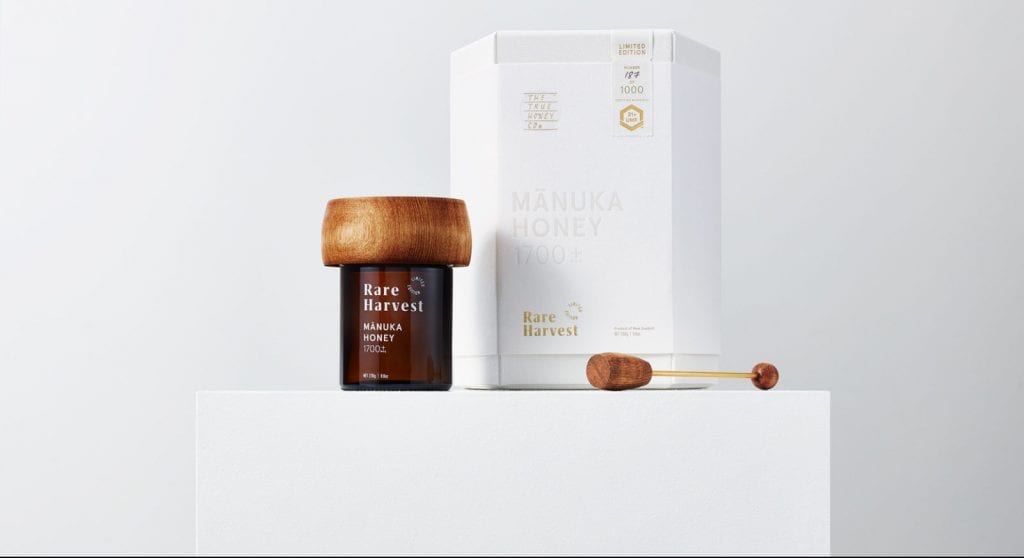On a shelf at Selfridges, you will find $1,662 jars of Manuka honey, if you are lucky. The London-headquartered retailer is regularly low on stock of the Rare Harvest-branded product. Despite eye-popping price tags of more than $150 for a single kilogram of the golden nectar, people across the globe are buying. In fact, the demand is so strong – and the profitability for producers so significant – that organized crime syndicates in New Zealander have taken to engaging in widespread theft of bees and Manuka-producing hives in order to cash in on the burgeoning market for the golden liquid.
Derived from shrub-like plants known for their sharp-tipped leaves and flurries of fragrant, eye-catching white or pink-flushed flowers, Manuka honey is a highly-regarded product adopted by celebrities – from Goop’s Gwyneth Paltrow and Poosh’s Kourtney Kardashian to tennis champ Novak Djokovic– and medical experts, alike, for its powerful antibacterial qualities, which has found its way into beauty products, cosmetics, and supplements. Aside from being hailed as “a miracle cure-all” for an array of issues and ailments – from allergies to wrinkles, the honey is at the center of an ongoing fight between Australia and New Zealand, one that centers on New Zealand-based beekeepers and Manuka producers efforts to legally monopolize the honey’s name.
The two countries have been embroiled in a high-stakes, back-and-forth battle over Manuka, which maintains a growing global market withhundreds of millions of dollars of sales. As of late, that fight has stretched beyond their respective borders to the home of Manuka honey’s biggest market: China.
Like Champagne, Porto wine, and Parmigiano-Reggiano cheese, which are covered by Protected Geographical Status laws (meaning that only sparkling wine that comes from the Champagne region of France, distilled spirits from the Douro Valley in the northern provinces of Portugal, and cheese from certain regions in Italy may be labelled as such), Manuka honey should be subject to protected status, the Manuka Honey Appellation Society argues, making it so that only authentic New Zealand-sourced product can carry the Manuka name.
In an effort to lay claim to this budding industry, the New Zealand-based association applied for exclusive rights to use the Manuka honey name in a number of different countries, including China.
The problem with that, according to the Australian Honey Bee Industry Council, the terrain of New Zealand is not the only home of the bushes that attract bees and produce the prized honey, making the Manuka Honey Appellation Society’s efforts “ridiculous and unfair,” especially since Australians are “growing exactly the same variety of plant.”
And more than that, as William van Caenegem, a law professor at Australia’s Bond University told Reuters, the meaning of the term, itself, is not what it used to be. “The problem is that the term manuka honey has become descriptive of the style rather than indicating geographical origin of the honey,” he says. “New Zealanders would say that manuka really comes from New Zealand and that’s how consumers see it whereas Australians just see it as a potent honey and that’s it.”
Yet, New Zealand Manuka organizations have not been deterred. In the latest leg of their fight, the Manuka Honey Appellation Society has landed government support for its quest for a Chinese trademark registration for the term “Manuka.”
New Zealand Agriculture Minister Damien O’Connor recently stated that “the producers’ application to Beijing’s Intellectual Property Court would protect the hard work of Kiwi manuka producers,” and as reported by Reuters, the New Zealand government is giving the Manuka Honey Appellation Society $3.6 million in funding in furtherance of its efforts aimed at trademark protection in Beijing. The Australian Honey Bee Industry Council will certainly fight back, calling the fight “a major trade issue in need of Department of Agriculture and Department of Trade involvement.”
Australian Manuka honey producers, including those from the Australian Manuka Honey Association, which is currently vying for government support of their own, says that if New Zealand receives a trademark registration for the name in China, they stand to lose nearly $700 million in annual sales.
The Chinese market – which is in the midst of what has been coined “Manuka madness” – is proving to be a particularly critical one for both Australian and New Zealand Manuka brands. Worsening pollution and product-safety scares are “changing consumer spending [habits],” Shaun Rein, managing director of Shanghai-based China Market Research Group told Bloomberg. “Anything that’s sort of natural is doing really well,” making Chinese demand at the forefront of the burgeoning Manuka market, and the quest for legal dominance.











